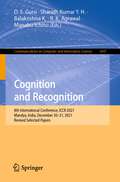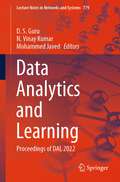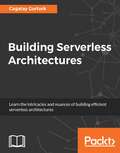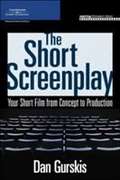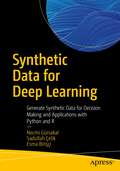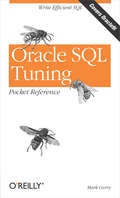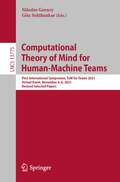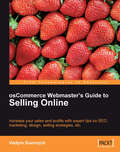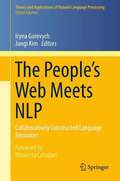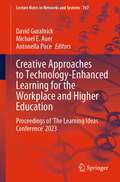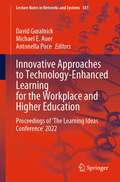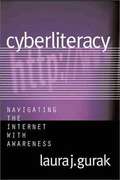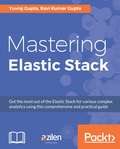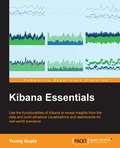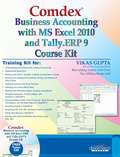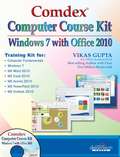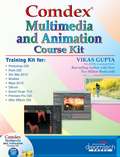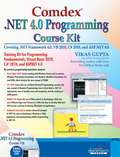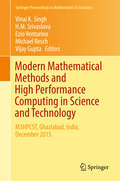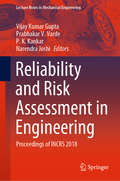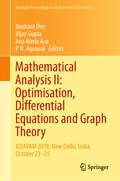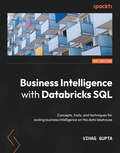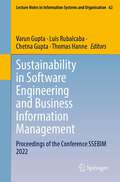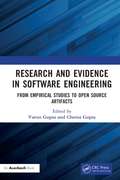- Table View
- List View
Cognition and Recognition: 8th International Conference, ICCR 2021, Mandya, India, December 30–31, 2021, Revised Selected Papers (Communications in Computer and Information Science #1697)
by D. S. Guru Sharath Kumar Y. H. Balakrishna K. R. K. Agrawal Manabu IchinoThis volume constitutes the refereed proceedings of the Eighth International Conference on Cognition and Recognition, ICCR 2021, held in Mandya, India, in December 2021.The 24 full papers and 9 short papers presented were carefully reviewed and selected from 150 submissions. The ICCR conference aims to bring together leading academic Scientists, Researchers and Research scholars to exchange and share their experiences and research results on all aspects of Computer Vision, Image Processing Machine Learning and Deep Learning Technologies.
Data Analytics and Learning: Proceedings of DAL 2022 (Lecture Notes in Networks and Systems #779)
by D. S. Guru N. Vinay Kumar Mohammed JavedThis book presents new theories and working models in the areas of data analytics and learning. The papers included in this volume were presented at the second International Conference on Data Analytics and Learning (DAL 2022), which was organized by the Department of Computer Science & Engineering, Alva’s Institute of Engineering & Technology, Moodbidri, Mangalore, Karnataka, India in association with the Department of Studies in Computer Science, University of Mysore, Mysuru, Karnataka, India. The areas covered include pattern recognition, image processing, deep learning, computer vision, data analytics, machine learning, artificial intelligence, and intelligent systems.
Building Serverless Architectures
by Cagatay GurturkBuild scalable, reliable, and cost-effective applications with a serverless architecture About This Book • Design a real-world serverless application from scratch • Learn about AWS Lambda function and how to use Lambda functions to glue other AWS Services • Use the Java programming language and well-known design patterns. Although Java is used for the examples in this book, the concept is applicable across all languages • Learn to migrate your JAX-RS application to AWS Lambda and API Gateway Who This Book Is For This book is for developers and software architects who are interested in designing on the back end. Since the book uses Java to teach concepts, knowledge of Java is required. What You Will Learn • Learn to form microservices from bigger Softwares • Orchestrate and scale microservices • Design and set up the data flow between cloud services and custom business logic • Get to grips with cloud provider's APIs, limitations, and known issues • Migrate existing Java applications to a serverless architecture • Acquire deployment strategies • Build a highly available and scalable data persistence layer • Unravel cost optimization techniques In Detail Over the past years, all kind of companies from start-ups to giant enterprises started their move to public cloud providers in order to save their costs and reduce the operation effort needed to keep their shops open. Now it is even possible to craft a complex software system consisting of many independent micro-functions that will run only when they are needed without needing to maintain individual servers. The focus of this book is to design serverless architectures, and weigh the advantages and disadvantages of this approach, along with decision factors to consider. You will learn how to design a serverless application, get to know that key points of services that serverless applications are based on, and known issues and solutions. The book addresses key challenges such as how to slice out the core functionality of the software to be distributed in different cloud services and cloud functions. It covers basic and advanced usage of these services, testing and securing the serverless software, automating deployment, and more. By the end of the book, you will be equipped with knowledge of new tools and techniques to keep up with this evolution in the IT industry. Style and approach The book takes a pragmatic approach, showing you all the examples you need to build efficient serverless applications.
The Short Screenplay: Your Short Film from Concept to Production
by Dan GurskisWith the growth of film festivals, cable networks, specialty home video, and the Internet, there are more outlets and opportunities for screening short films now than at any time in the last 100 years. But before you can screen your short film, you need to shoot it. And before you can shoot it, you need to write it. The Short Screenplay provides both beginning and experienced screenwriters with all the guidance they need to write compelling, filmable short screenplays. Explore how to develop characters that an audience can identify with. How to create a narrative structure that fits a short time frame but still engages the audience. How to write dialogue that's concise and memorable. How to develop story ideas from concept through final draft. All this and much more is covered in a unique conversational style that reads more like a novel than a "how-to" book. The book wraps up with a discussion of the role of the screenplay in the production process and with some helpful (and entertaining) sample scripts. This is the only guide you'll ever need to make your short film a reality!
Synthetic Data for Deep Learning: Generate Synthetic Data for Decision Making and Applications with Python and R
by Necmi Gürsakal Sadullah Çelik Esma BirişçiData is the indispensable fuel that drives the decision making of everything from governments, to major corporations, to sports teams. Its value is almost beyond measure. But what if that data is either unavailable or problematic to access? That’s where synthetic data comes in. This book will show you how to generate synthetic data and use it to maximum effect. Synthetic Data for Deep Learning begins by tracing the need for and development of synthetic data before delving into the role it plays in machine learning and computer vision. You’ll gain insight into how synthetic data can be used to study the benefits of autonomous driving systems and to make accurate predictions about real-world data. You’ll work through practical examples of synthetic data generation using Python and R, placing its purpose and methods in a real-world context. Generative Adversarial Networks (GANs) are also covered in detail, explaining how they work and their potential applications. After completing this book, you’ll have the knowledge necessary to generate and use synthetic data to enhance your corporate, scientific, or governmental decision making.What You Will LearnCreate synthetic tabular data with R and PythonUnderstand how synthetic data is important for artificial neural networksMaster the benefits and challenges of synthetic dataUnderstand concepts such as domain randomization and domain adaptation related to synthetic data generationWho This Book Is ForThose who want to learn about synthetic data and its applications, especially professionals working in the field of machine learning and computer vision. This book will also be useful for graduate and doctoral students interested in this subject.
Oracle SQL Tuning Pocket Reference
by Mark GurryOne of the most important challenges faced by Oracle database administrators and Oracle developers is the need to tune SQL statements so that they execute efficiently. Poorly tuned SQL statements are one of the leading causes of substandard database performance and poor response time. SQL statements that perform poorly result in frustration for users, and can even prevent a company from serving its customers in a timely manner. In this book, Mark Gurry shares his in-depth knowledge of Oracle's SQL statement optimizers. Mark's knowledge is the result of many hard-fought tuning battles during his many years of providing Oracle tuning services to clients. Mark provides insights into the workings of the rule-based optimizer that go well beyond what the rules tell you. Mark also provides solutions to many common problems that occur with both the rule-based and cost-based optimizers. In addition to the specific problem/solution scenarios for the optimizers, Mark provides a number of handy SQL tuning tips. He discusses the various optimizer hints, telling you when they can be used to good effect. Finally, Mark discusses the use of the DBMS_STATS package to manage database statistics, and the use of outlines to specify execution plans for SQL statements in third-party applications that you can't otherwise modify.
Computational Theory of Mind for Human-Machine Teams: First International Symposium, ToM for Teams 2021, Virtual Event, November 4–6, 2021, Revised Selected Papers (Lecture Notes in Computer Science #13775)
by Nikolos Gurney Gita SukthankarThis book constitutes the proceedings of the First International Symposium, ToM for Teams 2021, held in Washington, DC, USA, during November 4–6, 2021, Each chapter in this section tackles a different aspect of AI representing the thoughts and beliefs of human agents. The work presented herein represents our collective efforts to better understand ToM, develop AI with ToM capabilities (ASI), and study how to integrate such systems into human teams.
osCommerce Webmaster's Guide to Selling Online
by Vadym GurevychPacked with expert advice and practical examples of effective store design and report creation to help you make better decisions, formulate more effective strategies, and measure your success. This book is for anyone administering an osCommerce site, including webmasters, content managers, store owners, and marketing managers, who do not need to understand PHP or MySQL to benefit from this book. The tips and techniques described in this book can be applied to any small, medium sized e-commerce site. This is not an implementation guide; developers implementing osCommerce-based e-commerce sites would benefit from reading Deep Inside osCommerce: The Cookbook.
The People’s Web Meets NLP
by Iryna Gurevych Jungi Kim Nicoletta CalzolariCollaboratively Constructed Language Resources (CCLRs) such as Wikipedia, Wiktionary, Linked Open Data, and various resources developed using crowdsourcing techniques such as Games with a Purpose and Mechanical Turk have substantially contributed to the research in natural language processing (NLP). Various NLP tasks utilize such resources to substitute for or supplement conventional lexical semantic resources and linguistically annotated corpora. These resources also provide an extensive body of texts from which valuable knowledge is mined. There are an increasing number of community efforts to link and maintain multiple linguistic resources. This book aims offers comprehensive coverage of CCLR-related topics, including their construction, utilization in NLP tasks, and interlinkage and management. Various Bachelor/Master/Ph.D. programs in natural language processing, computational linguistics, and knowledge discovery can use this book both as the main text and as a supplementary reading. The book also provides a valuable reference guide for researchers and professionals for the above topics.
The People’s Web Meets NLP: Collaboratively Constructed Language Resources (Theory and Applications of Natural Language Processing)
by Iryna Gurevych Jungi KimCollaboratively Constructed Language Resources (CCLRs) such as Wikipedia, Wiktionary, Linked Open Data, and various resources developed using crowdsourcing techniques such as Games with a Purpose and Mechanical Turk have substantially contributed to the research in natural language processing (NLP). Various NLP tasks utilize such resources to substitute for or supplement conventional lexical semantic resources and linguistically annotated corpora. These resources also provide an extensive body of texts from which valuable knowledge is mined. There are an increasing number of community efforts to link and maintain multiple linguistic resources. This book aims offers comprehensive coverage of CCLR-related topics, including their construction, utilization in NLP tasks, and interlinkage and management. Various Bachelor/Master/Ph.D. programs in natural language processing, computational linguistics, and knowledge discovery can use this book both as the main text and as a supplementary reading. The book also provides a valuable reference guide for researchers and professionals for the above topics.
Creative Approaches to Technology-Enhanced Learning for the Workplace and Higher Education: Proceedings of ‘The Learning Ideas Conference’ 2023 (Lecture Notes in Networks and Systems #767)
by David Guralnick Michael E. Auer Antonella PoceNew technologies provide us with new opportunities to create new learning experiences, leveraging research from a variety of disciplines along with imagination and creativity. The Learning Ideas Conference was created to bring researchers, practitioners, and others together to discuss, innovate, and create.The Learning Ideas Conference 2023 was the 16th annual conference and was held as a hybrid event. The conference took place from June 14–16, 2023., both in New York and online, and included a special track: The ALICE (Adaptive Learning via Interactive, Collaborative and Emotional Approaches) Special Track.Topics covered in this book include among others: online learning methodologies, diversity and inclusion in learning, case studies in university and corporate settings, new technologies in learning (such as virtual reality, augmented reality, holograms, and artificial intelligence), adaptive learning, and project-based learning.The papers included in this book are of interest to researchers in pedagogy and learning theory, university faculty members and administrators, learning and development specialists, user experience designers, and others.
Innovative Approaches to Technology-Enhanced Learning for the Workplace and Higher Education: Proceedings of ‘The Learning Ideas Conference’ 2022 (Lecture Notes in Networks and Systems #581)
by David Guralnick Michael E. Auer Antonella PoceNew technologies provide us with new opportunities to create new learning experiences, leveraging research from a variety of disciplines along with imagination and creativity. The Learning Ideas Conference was created to bring researchers, practitioners, and others together to discuss, innovate, and create. The Learning Ideas Conference 2022 was the 15th annual conference and was the first time the conference was held as a hybrid event. The conference took place from June 15 to 17, 2022, both in New York and online, and included two special tracks: The Adaptive Learning via Interactive, Collaborative and Emotional Approaches (ALICE) Special Track and a track on Inclusive Learning. Topics covered in this book include, among others, online learning methodologies, diversity and inclusion in learning, case studies in university and corporate settings, new technologies in learning (such as virtual reality, augmented reality, holograms, and artificial intelligence), adaptive learning, and project-based learning. The papers included in this book are of interest to researchers in pedagogy and learning theory, university faculty members and administrators, learning and development specialists, user experience designers, and others.
Cyberliteracy: Navigating the Internet with Awareness
by Laura J. GurakFor anyone who has ever felt bewildered, dismayed, or even infuriated by the Internet, this helpful book clearly explains computer communications and how to become literate in cyberspace. With lively stories and interesting case histories, Laura Gurak shows how to sort fact from fiction, detect hoaxes, identify advertising masquerading as product information, protect privacy, and contend with other critical issues related to the new language of the Internet.
Mastering ELK Stack
by Yuvraj Gupta Ravi Kumar GuptaThis book cater to developers using the ELK stack in their day-to-day work who are familiar with the basics of Elasticsearch, Logstash, and Kibana, and now want to become an expert at using the ELK stack for data analytics.
Kibana Essentials
by Yuvraj GuptaUse the functionalities of Kibana to discover data and build attractive visualizations and dashboards for real-world scenariosAbout This BookPerform real-time data analytics and visualizations, on streaming data, using KibanaBuild beautiful visualizations and dashboards with simplicity and ease without any type of coding involvedLearn all the core concepts as well as detailed information about each component used in KibanaWho This Book Is ForWhether you are new to the world of data analytics and data visualization or an expert, this book will provide you with the skills required to use Kibana with ease and simplicity for real-time data visualization of streaming data.This book is intended for those professionals who are interested in learning about Kibana,its installations, and how to use it . As Kibana provides a user-friendly web page, no prior experience is required.What You Will LearnUnderstand the basic concepts of elasticsearch used in Kibana along with step by step guide to install Kibana in Windows and UbuntuExplore the functionality of all the components used in Kibana in detail, such as the Discover, Visualize, Dashboard,and Settings pagesAnalyze data using the powerful search capabilities of elasticsearchUnderstand the different types of aggregations used in Kibana for visualizationCreate and build different types of amazing visualizations and dashboards easilyCreate, save, share, embed, and customize the visualizations added to the dashboardCustomize and tweak the advanced settings of Kibana to ensure ease of useIn DetailWith the increasing interest in data analytics and visualization of large data around the globe, Kibana offers the best features to analyze data and create attractive visualizations and dashboards through simple-to-use web pages. The variety of visualizations provided, combined with the powerful underlying elasticsearch capabilities will help professionals improve their skills with this technology.This book will help you quickly familiarize yourself to Kibana and will also help you to understand the core concepts of this technology to build visualizations easily.Starting with setting up of Kibana and elasticsearch in Windows and Ubuntu, you will then use the Discover page to analyse your data intelligently. Next, you will learn to use the Visualization page to create beautiful visualizations without the need for any coding. Then, you will learn how to use the Dashboard page to create a dashboard and instantly share and embed the dashboards. You will see how to tweak the basic and advanced settings provided in Kibana to manage searches, visualizations, and dashboards. Finally, you will use Kibana to build visualizations and dashboards for real-world scenarios.You will quickly master the functionalities and components used in Kibana to create amazing visualizations based on real-world scenarios. With ample screenshots to guide you through every step, this book will assist you in creating beautiful visualizations with ease.Style and approachThis book is a comprehensive step-by-step guide to help you understand Kibana. It's explained in an easy-to-follow style along with supporting images. Every chapter is explained sequentially , covering the basics of each component of Kibana and providing detailed explanations of all the functionalities of Kibana that appeal.
Comdex Business Accounting
by Vikas GuptaThe book is a combination of two popular applications in their latest version, MS Excel 2010 and Tally.ERP 9. These two applications are widely used across small as well as large business houses and accounting firms. Vikas Gupta has devised the book for upcoming professionals looking for career opportunity in the field of finance and accounts management as well as for professionals who want to upgrade their skills by learning new versions of applications used in the field of business accounting.The book covers MS Excel 2010 and Tally.ERP 9 applications in an easy to understand language supported by ample screenshots and real life scenarios. The book helps you to master business accounting with the help of MS Excel 2010 and Tally.ERP 9 applications.
Comdex® Computer Course Kit: Windows 7 with Office 2010
by Vikas GuptaThe book covers all new features and programs of Windows, such as Internet Explorer, Outlook, etc. The book does not end here; after mastering Windows 7, the book introduces you to Microsoft Office 2010 and helps you in preparing professional letters, personal accounting sheets, presentations, databases and composing emails. Inside the Book: Computer Fundamentals Windows 7 Microsoft Word 2010 Microsoft Excel 2010 Microsoft Access 2010 Microsoft PowerPoint 2010 Microsoft Outlook 2010 The unique Tutor CD provided along with this book is a true add-on. While other books rely on theory and long explanations, the tutor CD accompanying this book helps you build skills on the software you have learned while reading the book.
Comdex Multimedia and Animation
by Vikas GuptaComdex Multimedia And Animation Course Kit Author: Vikas Gupta
Comdex .NET 4.0 Programming Course Kit
by Vikas GuptaThe book is an all-new approach to programming with VB 2010 and C# 2010 for Web and Window-based applications. These two applications are widely used by those aspiring students who wish to build their career in the field of .NET programming. This book is for upcoming professionals looking for career opportunity in the field of .NET programming as well as for professionals who want to upgrade their skills by learning new versions of applications used in the field of .NET programming. The book covers VB 2010, C# 2010, and ASP.NET 4.0 applications in an easy-to-understand language supported by ample screenshots and real life Scenarios. The content of the book goes in adequate detail covering all the aspects of .NET programming.
Modern Mathematical Methods and High Performance Computing in Science and Technology
by Vijay Gupta Michael Resch Ezio Venturino H. M. Srivastava Vinai K. SinghThe book discusses important results in modern mathematical models and high performance computing, such as applied operations research, simulation of operations, statistical modeling and applications, invisibility regions and regular meta-materials, unmanned vehicles, modern radar techniques/SAR imaging, satellite remote sensing, coding, and robotic systems. Furthermore, it is valuable as a reference work and as a basis for further study and research. All contributing authors are respected academicians, scientists and researchers from around the globe. All the papers were presented at the international conference on Modern Mathematical Methods and High Performance Computing in Science & Technology (M3HPCST 2015), held at Raj Kumar Goel Institute of Technology, Ghaziabad, India, from 27-29 December 2015, and peer-reviewed by international experts. The conference provided an exceptional platform for leading researchers, academicians, developers, engineers and technocrats from a broad range of disciplines to meet and discuss state-of-the-art mathematical methods and high performance computing in science & technology solutions. This has brought new prospects for collaboration across disciplines and ideas that facilitate novel breakthroughs.
Reliability and Risk Assessment in Engineering: Proceedings of INCRS 2018 (Lecture Notes in Mechanical Engineering)
by Vijay Kumar Gupta Prabhakar V. Varde P. K. Kankar Narendra JoshiThis volume is a collection of articles on reliability and safety engineering presented during INCRS 2018. The articles cover a variety of topics such as big data analytics and their applications in reliability assessment and condition monitoring, health monitoring, management, diagnostics and prognostics of mechanical systems, design for reliability and optimization, and machine learning for industrial applications. A special aspect of this volume is the coverage of performance, failure and reliability issues in electrical distribution systems. This book will be a useful reference for graduate students, researchers and professionals working in the area of reliability assessment, condition monitoring and predictive maintenance.
Mathematical Analysis II: ICRAPAM 2018, New Delhi, India, October 23–25 (Springer Proceedings in Mathematics & Statistics #307)
by Vijay Gupta P. N. Agrawal Ana Maria Acu Naokant DeoThis book collects original research papers and survey articles presented at the International Conference on Recent Advances in Pure and Applied Mathematics (ICRAPAM), held at Delhi Technological University, India, on 23–25 October 2018. Divided into two volumes, it discusses major topics in mathematical analysis and its applications, and demonstrates the versatility and inherent beauty of analysis. It also shows the use of analytical techniques to solve problems and, wherever possible, derive their numerical solutions. This volume addresses major topics, such as multi-objective optimization problems, impulsive differential equations, mathematical modelling, fuzzy mathematics, graph theory, and coding theory. It is a valuable resource to students as well as researchers in mathematical sciences.
Business Intelligence with Databricks SQL: Concepts, tools, and techniques for scaling business intelligence on the data lakehouse
by Vihag GuptaMaster critical skills needed to deploy and use Databricks SQL and elevate your BI from the warehouse to the lakehouse with confidenceKey FeaturesLearn about business intelligence on the lakehouse with features and functions of Databricks SQLMake the most of Databricks SQL by getting to grips with the enablers of its data warehousing capabilitiesA unique approach to teaching concepts and techniques with follow-along scenarios on real datasetsBook DescriptionIn this new era of data platform system design, data lakes and data warehouses are giving way to the lakehouse – a new type of data platform system that aims to unify all data analytics into a single platform. Databricks, with its Databricks SQL product suite, is the hottest lakehouse platform out there, harnessing the power of Apache Spark™, Delta Lake, and other innovations to enable data warehousing capabilities on the lakehouse with data lake economics. This book is a comprehensive hands-on guide that helps you explore all the advanced features, use cases, and technology components of Databricks SQL. You'll start with the lakehouse architecture fundamentals and understand how Databricks SQL fits into it. The book then shows you how to use the platform, from exploring data, executing queries, building reports, and using dashboards through to learning the administrative aspects of the lakehouse – data security, governance, and management of the computational power of the lakehouse. You'll also delve into the core technology enablers of Databricks SQL – Delta Lake and Photon. Finally, you'll get hands-on with advanced SQL commands for ingesting data and maintaining the lakehouse. By the end of this book, you'll have mastered Databricks SQL and be able to deploy and deliver fast, scalable business intelligence on the lakehouse.What you will learnUnderstand how Databricks SQL fits into the Databricks Lakehouse PlatformPerform everyday analytics with Databricks SQL Workbench and business intelligence toolsOrganize and catalog your data assetsProgram the data security model to protect and govern your dataTune SQL warehouses (computing clusters) for optimal query experienceTune the Delta Lake storage format for maximum query performanceDeliver extreme performance with the Photon query execution engineImplement advanced data ingestion patterns with Databricks SQLWho this book is forThis book is for business intelligence practitioners, data warehouse administrators, and data engineers who are new to Databrick SQL and want to learn how to deliver high-quality insights unhindered by the scale of data or infrastructure. This book is also for anyone looking to study the advanced technologies that power Databricks SQL. Basic knowledge of data warehouses, SQL-based analytics, and ETL processes is recommended to effectively learn the concepts introduced in this book and appreciate the innovation behind the platform.
Sustainability in Software Engineering and Business Information Management: Proceedings of the Conference SSEBIM 2022 (Lecture Notes in Information Systems and Organisation #62)
by Varun Gupta Luis Rubalcaba Chetna Gupta Thomas HanneThe proceedings volume presents selected papers from the International Conference on Sustainability in Software Engineering & Business Information Management: Innovation & Applications (SSEBIM 2022) held in Olten, Switzerland from September 23-24, 2022. It includes research related to sustainability from both a business and technical point of view. From a business perspective, it not only addresses how to make the business operations more sustainable, but also considers factors such as human values, ethics, environment and responsibility of the businesses. From the technical perspective of software development companies, it focuses on sustainability in software engineering ranging from practices, tools, techniques and methods. The contributions reflect how software engineering teams exhibited pro-activeness in their approaches to lead to sustainable development of the software that is of highest quality and reliability.It is intended for a broad audience, including students, researchers and practitioners who work in software engineering and business information management fields.
Research and Evidence in Software Engineering: From Empirical Studies to Open Source Artifacts
by Varun Gupta Chetna GuptaResearch and Evidence in Software Engineering: From Empirical Studies to Open Source Artifacts introduces advanced software engineering to software engineers, scientists, postdoctoral researchers, academicians, software consultants, management executives, doctoral students, and advanced level postgraduate computer science students. This book contains research articles addressing numerous software engineering research challenges associated with various software development-related activities, including programming, testing, measurements, human factors (social software engineering), specification, quality, program analysis, software project management, and more. It provides relevant theoretical frameworks, empirical research findings, and evaluated solutions addressing the research challenges associated with the above-mentioned software engineering activities. To foster collaboration among the software engineering research community, this book also reports datasets acquired systematically through scientific methods and related to various software engineering aspects that are valuable to the research community. These datasets will allow other researchers to use them in their research, thus improving the quality of overall research. The knowledge disseminated by the research studies contained in the book will hopefully motivate other researchers to further innovation in the way software development happens in real practice.
